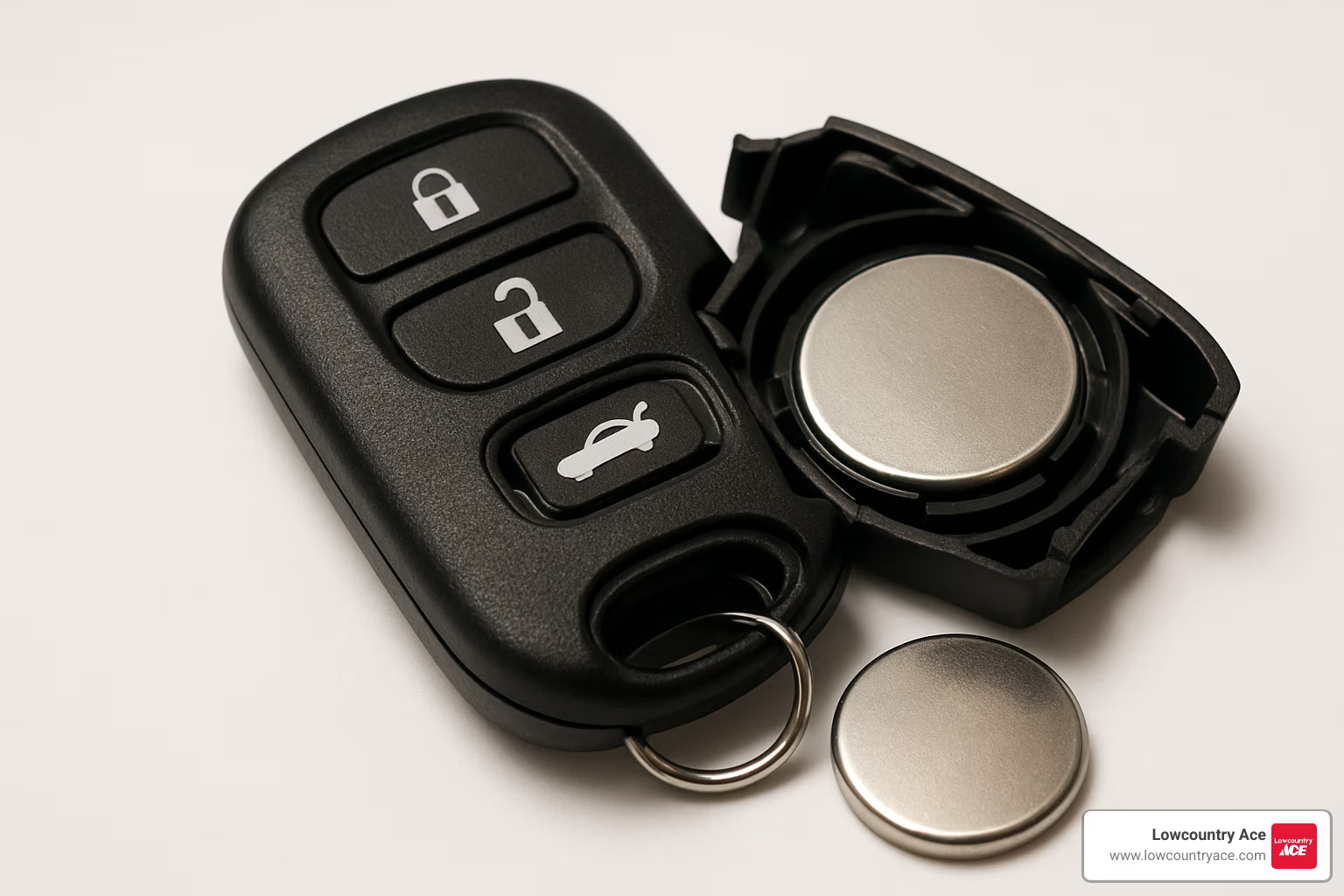Car Key Battery Price: Top 5 Best Deals 2025 Guide
Why Understanding Car Key Battery Costs Matters
Car key battery price typically ranges from $1.42 to $10 for DIY replacement, while professional installation costs $9.75 to $50 depending on where you go. Here’s what you need to know:
Quick Price Guide:
– Generic coin batteries: $1.42-$3 each (bulk packs)
– Name brand singles: $5-$10 each
– Locksmith replacement: $9.75 flat rate
– Dealership service: $20-$50 including labor
If you’re running late for work, the last thing you need is a missing car key – or worse, a key fob that won’t respond because of a dead battery. Most drivers don’t think about their key fob battery until it stops working, leaving them stranded in a parking lot or unable to start their push-button vehicle.
The good news? Replacing a key fob battery is one of the easiest and cheapest car maintenance tasks you can do yourself. Most car keys use simple coin-cell batteries like CR2032 or CR2025 that cost just a few dollars and take minutes to replace.
The reality check: Many people end up paying 5-10 times more than necessary by going to the dealership for what should be a simple battery swap. Understanding car key battery price options – from DIY replacement to professional service – can save you both money and frustration when your fob inevitably goes dead.
Whether you’re dealing with a Toyota Camry, Honda Accord, or any other vehicle, the process and costs are surprisingly similar. Smart key fobs typically last 2-3 years, while regular remotes can last 4-6 years, so knowing your replacement options ahead of time pays off.
The helpful team at Lowcountry Ace has extensive experience helping Charleston-area customers steer car key battery price options and find the most cost-effective solutions for their vehicle needs. Our background in automotive services and local hardware expertise makes us uniquely qualified to guide you through both DIY and professional car key battery price considerations.
Car key battery price word list:
– DIY car key cutting
– ace hardware auto key cutting cost
– ace hardware automotive keys
Car Key Batteries 101: Function & Common Types
Think of your car key fob as a tiny radio station that fits in your pocket. Inside that plastic shell sits a coin cell battery – usually a 3-volt lithium powerhouse that keeps your keyless life running smoothly. Every time you press a button, your fob sends an encrypted radio signal to your car, telling it to open up, lock, or even start the engine.
The car key battery price you’ll pay depends largely on which type your fob needs. The most common varieties are CR2032, CR2025, CR2016, and CR2450 batteries. Those numbers aren’t random – they tell you exactly what size battery you’re dealing with. A CR2032, for instance, measures 20mm across and 3.2mm thick.
Here’s a handy detail most people don’t know: nearly every modern key fob has a hidden E-blade tucked inside. This little mechanical key slides out when you need it, giving you a backup way to open up your door when the battery gives up completely. It’s like having a spare tire for your keyless entry system.
Battery capacity gets measured in mAh (milliamp hours), and this number directly affects how long your fob will keep working. A higher mAh rating means longer battery life, which translates to better value when you’re comparing car key battery price options.
Why Your Fob Needs Power
When your key fob battery starts dying, it doesn’t just stop working overnight – it gives you warning signs. First, you’ll notice range loss. Instead of open uping your car from halfway across the parking lot, you’ll need to get closer and closer to make it respond.
Push-to-start vehicles are especially picky about battery power. Even if your fob is sitting right there in the cupholder, a weak battery can leave you stranded because the car can’t detect the security chip inside your key. The engine simply won’t start, no matter how many times you press that button.
Your fob works by sending encrypted signals on a specific frequency. When the battery gets weak, that signal becomes too faint for your car’s receiver to pick up. It’s like trying to have a conversation by whispering across a crowded room – eventually, the message just doesn’t get through.
Which Battery Does My Key Use?
The easiest way to find your battery type is checking your owner’s manual. Look for sections labeled “Keyless Entry” or “Remote Control” – they’ll list the exact part number you need. No digging through glove compartments? No problem.
You can also pop open your key fob to see what’s inside. Most fobs have a small tab or seam where you can gently pry them apart with a coin or small screwdriver. The battery will have its model number printed right on top – usually something like CR2032 or CR2025.
CR2032 vs CR2025 specs show some important differences worth knowing:
| Battery Type | Diameter | Thickness | Capacity | Typical Lifespan |
|---|---|---|---|---|
| CR2032 | 20mm | 3.2mm | 225 mAh | 4-5 years |
| CR2025 | 20mm | 2.5mm | 165 mAh | 3-4 years |
The main difference is thickness – and that tiny variation matters more than you’d think. A CR2032 packs more power but won’t fit in a fob designed for the slimmer CR2025. Using the wrong size can prevent your fob from closing properly or cause connection problems.
The helpful team at Lowcountry Ace can help you identify the right battery for your specific key fob and explain the car key battery price differences between various brands and types. We’ve helped countless Charleston-area drivers get back on the road with the right replacement battery at fair prices.
Car Key Battery Price Breakdown
When you’re standing in the battery aisle wondering why some coin cells cost $1 while others cost $10, you’re not alone. Car key battery price varies dramatically based on brand, pack size, and where you shop – but understanding these differences can save you serious money.
The biggest factor affecting car key battery price is whether you buy generic or name-brand batteries. Generic CR2032 batteries in bulk packs can cost as little as $0.66 each, while premium single batteries from well-known manufacturers might run $8.99. That’s more than a 13x price difference for essentially the same product.
Pack size makes a huge difference too. Buying a 4-pack of generic CR2032 batteries for $5.69 brings your per-battery cost down to just $1.42. Compare that to buying singles at $3 each, and you’re looking at real savings. Since these batteries have a 10-year shelf life, stocking up makes perfect sense.
Here’s the thing about car key battery price and longevity: sometimes paying a bit more upfront actually saves money. A quality battery that lasts 5 years instead of 3 years costs less over time, even if the initial price is higher. Smart key fobs that constantly communicate with your car drain batteries faster than basic remotes, so factor in your replacement frequency when calculating true costs.
Retail Car Key Battery Price Chart
Shopping around reveals some eye-opening car key battery price differences. Generic CR2032 or CR2025 batteries typically run $2-$3 each when bought individually. Step up to name brands, and you’ll pay $4-$9 per battery, though they often come in convenient 2-packs.
The real savings come from bulk purchases. A 10-pack of generic CR2032 batteries costs around $6.59 – that’s just $0.66 per battery. Even name-brand 8-packs bring the per-unit cost down to around $1.24 each. For most folks, a 2-4 pack hits the sweet spot between savings and not overstocking your junk drawer.
Premium batteries do offer some genuine advantages beyond just brand recognition. They often include bitter coatings to prevent accidental swallowing by children and child-resistant packaging that requires scissors to open. If you have little ones around, these safety features justify the extra cost. Scientific research on lithium coin safety shows these protective measures significantly reduce ingestion risks.
The helpful team at Lowcountry Ace has noticed that customers who buy 2-4 packs tend to be happiest with their purchase. You get decent savings without buying more batteries than you’ll use in the next decade, and you always have a spare when your backup key fob starts acting up.
Professional Car Key Battery Price Range
If you’d rather have someone else handle the battery swap, professional car key battery price varies wildly depending on where you go. We’ve seen customers pay anywhere from $9.75 to $50 for identical services at different locations around Charleston.
Specialized locksmiths typically offer the best value at $9.75 flat rate for most standard key fobs. Local repair shops usually charge $15-$25 including the battery, which is still reasonable for the convenience. The sticker shock comes at vehicle dealerships, where the same 5-minute job can cost $20-$50 once you factor in their hourly rates and parts markup.
Dealerships often add diagnostic fees and insist on using their branded batteries, turning a simple swap into an expensive service call. A battery that costs $3 retail suddenly becomes a $15 “OEM part” with labor charges on top. The math rarely works in your favor unless you’re dealing with a complex smart key that requires special handling.
That said, professional service makes sense in certain situations. If your key fob housing is cracked, waterproofed, or needs reprogramming after battery replacement, the expertise justifies the cost. More info about Key Fob Replacement Services covers when it’s worth paying for professional help versus tackling the job yourself.
The bottom line on professional car key battery price: shop around, ask about flat rates, and don’t assume the dealership is your only option. A few phone calls can save you $30 or more on what should be a simple, inexpensive fix.
Replacement Options & Money-Saving Hacks
The biggest money-saving opportunity with car key battery price is simply learning to do it yourself. This straightforward 5-minute task can save you anywhere from $15 to $45 each time you need a replacement. When you consider that most drivers need new batteries every 3-5 years, those savings really add up over time.
Here’s the thing – most key fobs are actually designed for easy battery swaps. You typically only need a small flat-head screwdriver or even a coin to get the job done. The trick is being gentle with the plastic housing so you don’t break those little tabs that hold everything together.
Before you start any DIY swap, there’s one crucial step that’ll save you headaches later: check the polarity. Those little + and – symbols on the battery need to match exactly, or your fob will be as useful as a paperweight. Take a quick photo of how the old battery sits before you remove it – trust me, you’ll thank yourself later.
If you’re keeping spare batteries around the house (which is smart), make sure they’re stored safely away from kids. Those coin cells might look harmless, but they’re dangerous if swallowed. Keep them in their original packaging and up high where curious little hands can’t reach them.
Multi-pack savings make a huge difference in your overall car key battery price. A 4-pack that costs around $6 gives you four years worth of replacements for most people, compared to paying $8-$10 for single batteries every time. Since lithium coin batteries last up to 10 years on the shelf, buying in bulk just makes sense.
Don’t toss those dead batteries in the trash – many electronics stores and auto parts places will recycle them for free. The lithium inside has value, and proper disposal keeps nasty chemicals out of landfills.
Want to extend your battery life? Try not to fidget with your key fob unnecessarily. Every button press drains a tiny bit of power, and those unnecessary clicks while you’re walking or sitting add up over months.
DIY Steps to Slash Your Car Key Battery Price
Opening your fob is usually the trickiest part, but it’s not rocket science. Look for a small notch or seam running around the edge of your key fob. Slide a flat-head screwdriver or coin into this gap and give it a gentle twist to pop the two halves apart. Some newer fobs have a release button or sliding mechanism instead – if you’re scratching your head, your owner’s manual will show you the way.
Before you touch that old battery, grab your phone and snap a clear photo showing which side faces up. You’ll see + and – markings that absolutely must match when you put the new one in. Getting this backwards means your fob becomes an expensive piece of plastic.
Removing the old battery is straightforward – just lift it out with your fingernail or a small plastic tool. Avoid using metal tools that might scratch the contacts inside. Press the new battery down in exactly the same spot and orientation until it sits nice and flush.
Snapping everything back together requires a bit of patience. Line up the two halves carefully and press them together until you hear that satisfying click. Now comes the fun part – test all your buttons to make sure everything works, then walk away from your car while pressing the lock/open up button to check your range.
Here’s something interesting we’ve noticed at Lowcountry Ace: generic batteries perform just as well as name brands when the specs match exactly. A generic CR2032 that costs $1.42 will power your fob just as effectively as an $8.99 name-brand battery. The key is buying from suppliers who stand behind their products with guarantees.
When to Call a Pro
Sometimes DIY just isn’t the right call, and that’s perfectly okay. If your key fob housing is cracked or looks like it’s been through a washing machine, trying to open it yourself might turn a simple battery replacement into a need for a whole new key.
Waterproof smart keys found in many luxury vehicles are a different beast entirely. These require special tools and techniques to maintain their weather sealing. One wrong move and you’ve got a key that works fine until the next rainstorm.
Re-sync issues can pop up after battery replacement, especially in newer cars with fancy security systems. If your fob doesn’t respond after a successful battery swap, the key might need reprogramming that requires dealer-level equipment. It’s frustrating, but some vehicles are just picky that way.
Complex fobs with proximity sensors, touch-sensitive buttons, or little LCD screens benefit from professional handling. These advanced features increase the chances of something going wrong during a DIY attempt, making that professional service fee look like cheap insurance.
The helpful team at Lowcountry Ace has seen plenty of situations where customers saved money by knowing when to tackle the job themselves versus when to call in the pros. More info about Car Key Replacement Near Me can help you figure out which route makes the most financial sense for your specific situation.
Frequently Asked Questions
How long does a key-fob battery last?
The answer depends on what type of key you’re carrying around. Smart key fobs that are constantly chatting with your car – you know, the fancy ones that let you walk up and the doors automatically open up – typically need new batteries every 2-3 years. They’re basically little radio stations that never stop broadcasting.
Basic remote-entry keys are much more laid back. Since they only work when you actually press a button, they can cruise along for 4-6 years before needing a battery swap. It’s like the difference between someone who talks nonstop versus someone who only speaks when they have something important to say.
Here’s something that might surprise you: where you live affects your battery life. If you’re dealing with Charleston’s sweltering summers or those occasional cold snaps, your battery won’t last as long. Extreme temperatures make lithium batteries work harder, which means more frequent trips to replace them.
Features that drain your battery faster include remote start (especially popular here in the Lowcountry), proximity open uping, and push-button ignition. The more bells and whistles your key has, the more often you’ll be thinking about car key battery price.
Will I need to reprogram after a swap?
Good news – most key fobs keep their memory when you swap the battery, as long as you don’t dawdle during the replacement. Your key has a separate memory chip that stores all those security codes, so it doesn’t forget which car it belongs to just because the battery died.
The trick is working quickly. If you leave your fob sitting there powerless for more than a few minutes while you hunt around for the right battery, some vehicles get a bit forgetful. This happens more often with older cars or certain luxury brands that have extra security protocols.
If your fob seems confused after a battery change, don’t panic. Check your owner’s manual for a simple reset procedure – many cars have a button sequence that gets everything talking again. It’s usually something like holding down specific buttons while sitting in the driver’s seat.
When the DIY reset doesn’t work, that’s when it makes sense to call in professional help. The helpful team at Lowcountry Ace has seen this situation plenty of times and can guide you toward the right solution without breaking the bank.
Is it safe to use off-brand batteries?
Absolutely, generic batteries work just fine when they match your original battery’s specifications exactly. You need the same voltage (3V for most key fobs), the same size (like CR2032 or CR2025), and similar capacity ratings.
Here’s a little secret: many generic batteries come from the same factories as the expensive name brands. You’re often paying extra for fancy packaging and marketing rather than better performance. At Lowcountry Ace, we’ve watched customers get excellent results from quality generic options that cost 60-70% less than premium alternatives.
The main advantage of name brands is the extra safety features – things like child-resistant packaging and bitter coatings that make the batteries taste awful if a curious toddler gets hold of one. If you’ve got little ones running around your house, those safety features might be worth the extra dollars for peace of mind.
The bottom line on car key battery price: whether you choose generic or name brand, you’re still saving a fortune compared to dealership replacement costs. A $2 generic battery that works perfectly is infinitely better than a $45 service call for the exact same result.
Conclusion
Understanding car key battery price options puts you in control when your fob starts acting up. Whether you go the budget-friendly DIY route for under $2 or prefer the peace of mind that comes with professional service, you’ll never have to worry about getting caught off guard by inflated prices again.
The helpful team at Lowcountry Ace has your back when it comes to car key battery replacement in the Charleston area. We stock all the common key fob batteries and love helping our neighbors figure out the best approach for their situation – whether that’s grabbing a quick battery for a weekend project or getting professional guidance for a tricky smart key.
Shopping local has real advantages beyond just supporting your community. We get the unique challenges of living in coastal South Carolina, from how that salty sea air can mess with your electronics to working around the crazy summer tourist schedules. When you need a battery fast, our convenient locations mean you’re back on the road in minutes, not hours.
Quick pickup makes all the difference when you’re dealing with a dead key fob. Nobody wants to be stuck in a parking lot calling for help when a $2 battery could solve the whole problem. We keep our shelves stocked so you can grab what you need and get back to your day.
For those times when you’re dealing with something more complex – maybe a broken fob housing or a key that needs reprogramming – Car Key Replacement Ace Hardware offers same-day solutions that won’t break the bank. You get dealership-quality service without the dealership prices.
A little planning goes a long way. Toss a spare battery in your glove compartment, figure out what type your key uses before you need it, and don’t ignore those warning signs when your fob starts getting finicky. With car key battery price options starting under $2, there’s really no excuse for letting a dead battery ruin your plans.
Stop by any of our locations when you’re ready to tackle this simple fix – we’re here to help make it as easy as possible.
Lowcountry Ace Hardware: Your one-stop shop for home improvement. We offer quality products from trusted brands and expert advice from our experienced staff. Located on James Island, visit us for tools, hardware, fishing gear, power tools, building materials, grills & smokers, electrical and plumbing supplies, and more.
















